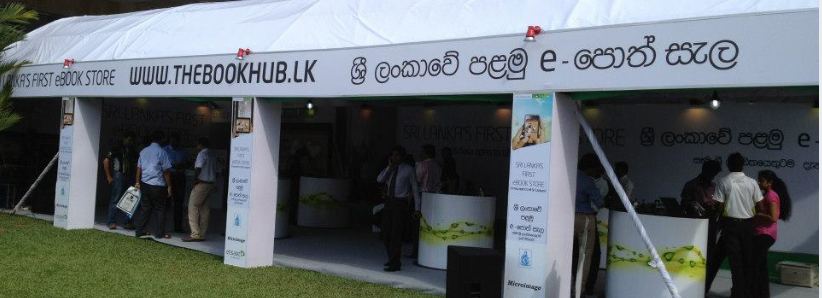Vijitha Yapa, President of the Sri Lanka Book Publishers Association has said it is planning for the country’s biggest cultural event and Sinhala literature showcase, the Colombo International Book Fair, to go ahead at the BMICH September 18 to 27, subject to Covid-19 conditions nearer the time.
In an interview with the Sunday Observer Yapa spoke about the book fair and the Swarna Pusthaka and Rajatha Pusthaka award ceremonies.
Conceding the book fair announcement should be seen as temporary and subject to revision, Yapa said of the awards ceremonies:
With the Swarna Pusthaka Award Ceremony, it needs only three hours whereas the book fair goes on for 10 days. So, we are hoping very much that it can be held. But we cannot say anything for certain.
As for the Rajatha Pusthaka, we have decided only to make the media announcement. Ideally, we would like to hold all these events as they are our main events, but once again it’s too early to give make an official announcement. We have almost three months to plan these things. But the thing is we haven’t been given the health authorities’ guidelines. When those are given, we can take a firm decision.
Asked by the Sunday Observer if participation was likely to be lower this year if the event does go ahead, Yapa said:
That is a difficult question to answer, because after we make our official announcement, once we are very clear, then people will have to apply for the stalls. At present, we can’t tell what the costs are and what places are available. For instance, one of the halls at the BMICH which is called the Nuga Sevena, is not available at all, because it is dilapidated. Everything is a bit uncertain at the moment, but we hope perhaps in July or August things will be clearer. We are just gathering information now.
On international participation, Yapa noted the current quarantine rules mean international visitors will not be coming but he did suggest overseas publishers might want to partner with local representatives to run the stalls for them without needing to attend.
The Colombo event’s main foreign presence would be expected from India, where the fierce Covid-19 situation means attendance will almost certainly not happen this year.
Yapa called for a repeal or at least temporary relief of the 15% tax on imported book printing paper to try bring book prices down to attract booklovers back to bookstores.
Talking about the impact of the curfew in Sri Lanka, Yapa said,
Though bookshops were closed during the curfew, their websites were open. Therefore, a lot of deliveries had been made by various bookshops to customers (and exported) so I don’t think we can say our readership has dropped.
On international prospects for Sri Lanka’s publishing industry, Yapa had this to say:
We have not yet exposed ourselves enough to the foreign market. We need a special program to reach this target. If we take the London Book Fair or the Frankfurt Book Fair, during that period the hotel room costs go up three times the normal. So, this means a lot of money and a lot of investments. Even airline ticket prices also go higher during that particular time. Hence, many factors had to be looked into.
What was noticeable in Yapa’s assessment of the Sri Lankan publishing scene was that, other than a reference to online sales bailing out publishers as bookstores closed, digital did not really come up.
As an island nation of 21 million people, with internet penetration at 33%, that’s perhaps unsurprising, but even that 33% means over 7 million people online, and as we know from elsewhere, digital markets of fewer people can and do have vibrant digital books economies boosting publishers’ bottom lines and improving consumer engagement.
Sweden-based Storytel, for example, has happily invested in its digital books subscription apparatus in markets like Denmark (5.6 million online), Norway (5.3m), Finland (5.2m), Singapore (5.1m), Bulgaria (4.6m) and even Iceland with just 0.3 million internet users.
Sweden itself has fewer than 10 million people online. Yet Sweden and Denmark both have four or more competing digital books subscription services, all growing, clearly demonstrating that, when publishers offer booklovers choice, consumers vote with their smartphones, and that population size need not be a problem.
Digital opens up publishing reach beyond bookstores and online print sellers, and for a country like Sri Lanka, where English and Tamil are widely spoken alongside Sinhala, it also offers publishers easy access to international markets. There are 70 million Tamil speakers in India, for example, alongside global English-language reach.
Not to mention English-language books demand within the country.
For the past three years Malaysia-based Big Bad Wolf has shipped 1.5 million English-language books to Sri Lanka, to be sold at 24/7 eleven-day flash sales that attract huge crowds.
Sri Lanka’s first ebook store emerged back in 2012, and launched with great fanfare, but BookHUB didn’t last the course. Possibly the 25 titles at launch with ambitions to offer 100 ebook titles was the problem.

A quick online search suggests other contenders, such as Purelankan, also fell by the wayside.
Today the big western ebook audiobook purveyors have no interest in Sri Lanka – only Kobo is available, and that through the US international – and Storytel is unlikely to be looking at Sri Lanka any time soon.
But the potential is there, and as publishers in countries like Norway and Denmark are demonstrating, it’s nowadays not at all difficult to set up your own digital books subscription service for markets with fewer internet users than Sri Lanka has.
But even just for overseas reach the potential returns of investing in digital ought to have the undivided attention of Sri Lanka’s publishers.
And the first step is to learn from the failure of BookHUB.
Would a reader go into a bricks & mortar bookstore that only had 25 titles?
Why should a digital books store be any different?
But give consumers choice and good prices along with the convenience of 24/7 shopping from the comfort of home with instant delivery to their smartphone or tablet, and the interest – and revenue – will follow.





